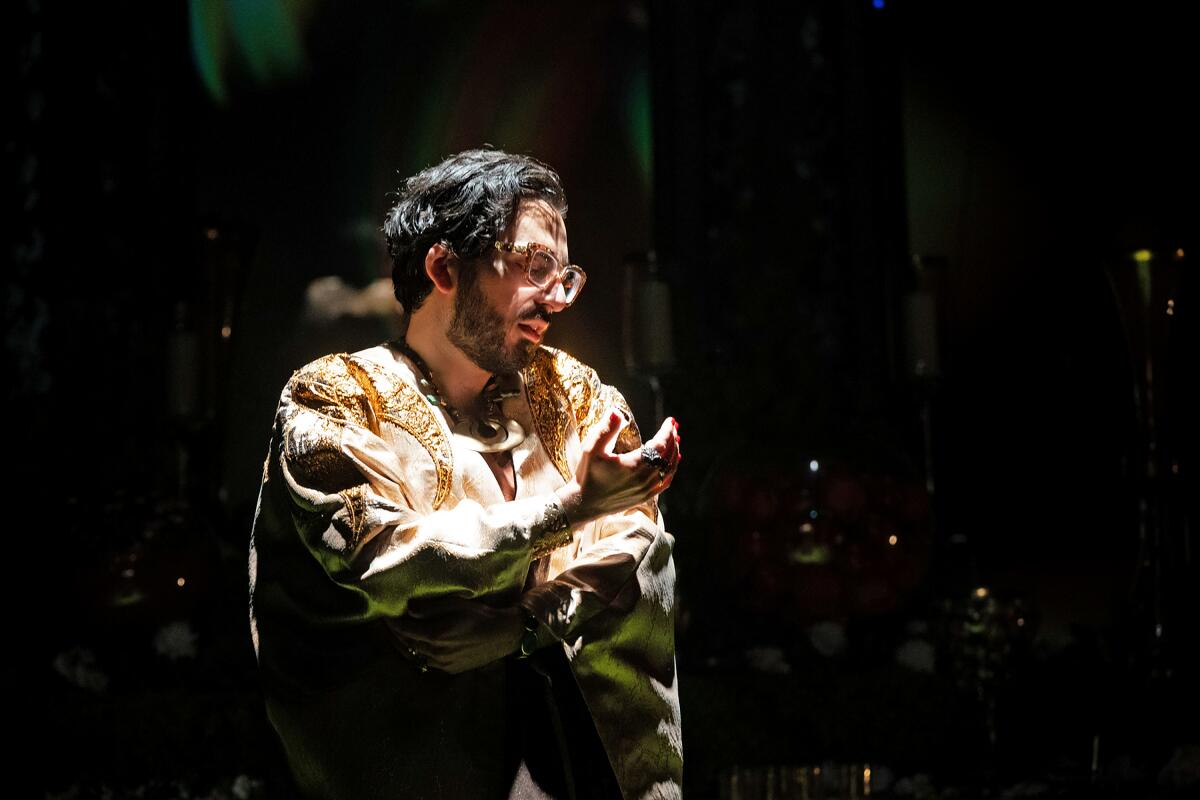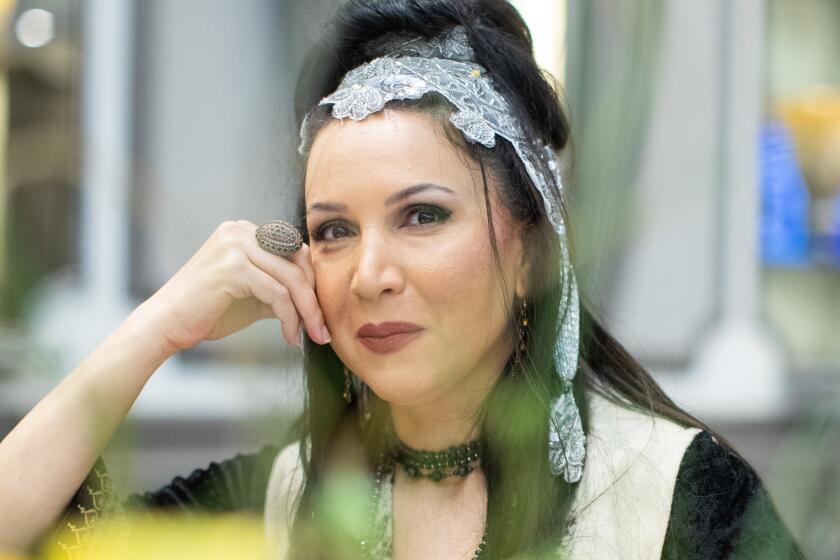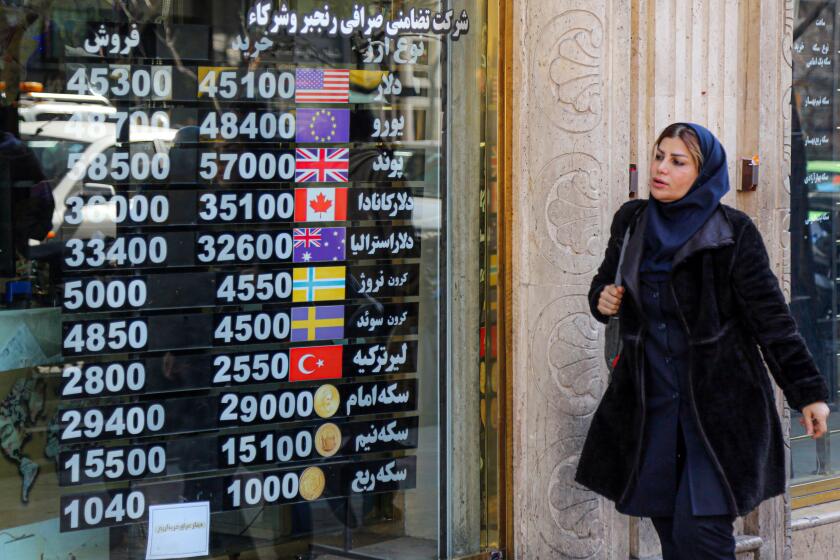Michael Shayan had to transform into his mother to tell the story of ‘Avaaz’

At the age of 12, Michael Shayan was turning water into Manischewitz wine. It wasn’t a miracle, it was magic.
“That’s when my mother knew I was gay,” he joked.
Magic brought him to the stage. He’d put on his uncle’s double-breasted suit jacket and perform at bar mitzvahs. He even had his own magic company. Shayan lied about his age and auditioned for the Hollywood Magic Castle — the age requirement to be a junior magician member was 13. They let him in anyway.
“That’s when I knew I was gay,” he quipped.
Shayan’s fascination with magic stemmed from his upbringing.
“We were in this small apartment and magic was my escape,” he said. “It was the way of imagining a new life for myself and also for my mother.”
The first woman to practice the ancient Iranian art of epic storytelling, Gordafarid inspires the Iranian diaspora as women fight for their rights back home.
Shayan’s latest trick is turning into his mother six times a week at the South Coast Repertory in Costa Mesa, or at least a character inspired by her. He called it “every gay man’s dream or nightmare, depending on how you feel about your mother.”
As the character Roya in his one-man show “Avaaz” — running until May 27 — he welcomes audiences to “Tehrangeles,” a.k.a. Westwood. It’s Nowruz, Iranian New Year, and Roya is serving chicken, tea and looks (designed by Joshua “Domino” Schwartz). But behind the extravagant affair unfolds a personal family tale about how Roya immigrated from Tehran to America and started a new life.
“Avaaz,” written by Shayan and directed by Moritz von Stuelpnagel, developed out of a channeling exercise for playwriting he did with Luis Alfaro during a fellowship at the Lambda Literary Writer’s Retreat for Emerging LGBTQ Voices in 2017. Alfaro, the then-associate artistic director of Center Theatre Group, instructed the fellows using a method popularized by Cuban American playwright María Irene Fornés, telling them to place a hand over their hearts and feel the heartbeat of a character.
“He said, ‘Just listen,’” Shayan recalled Alfaro saying. “I did that and I felt the presence of my mother.”

When he told his mother the visions that came to him during the exercise, many of them ended up being true to her experience. He went on to interview his mother about her life, even though she had never talked about her past before. “It was like this taboo subject,” he said.
“I think that interview really opened something up for her and she told me things in that interview she never told me before,” he said.
The WGA announced Monday that it would not picket the Broadway awards show, scheduled for June 11, allowing it to proceed in altered form.
The experience opened his eyes to the life she lived and their complicated relationship. The mother and son did a lot together. They went to school at the same time. They did homework and rode the bus together. They lived in a small, one-bedroom apartment in Westwood and slept on twin beds “so close we could feel each other breathe,” Shayan said, reciting the poignant lines of the play.
“It felt like we were really growing up at the same time and she acknowledges that too,” he said.
As he started to explore playwriting — with a nudge from his former Harvard professor — he saw how theater could be a vessel for the larger questions he had about his identity as a queer Jewish Iranian American.
“I felt like an outsider in some ways,” he said. “Too Jewish for my Iranian community, too Iranian for my Jewish community and too gay for both of those.”

During the run of “Avaaz,” he witnessed how the show connected his various communities. After one performance, a group of gay men cheered “mother” as Shayan walked out of the theater. Another time, a large group of queer Iranians saw the show and shared their coming-out and mother-son stories afterward.
“I have Iranian women coming up to me after the show, many of whom shared that they’ve never stepped foot inside of an American theater,” Shayan said.
One woman’s response, in particular, has stuck with him. “Thank you for every second,” he recalled her saying in Farsi. “Thank you for every feeling. Thank you for telling my story.”
Political and economic instability is spurring more Iranians to look for a way to leave their country, through both legitimate and illegal means.
Shayan dedicated “Avaaz” to the protest movement in Iran against compulsory hijab . While working on the play, he learned that his mother and aunt as young women were taken to the same detention center as Mahsa Amini — the 22-year-old woman who became the symbol of resistance in Iran after dying in police custody, where she was being detained for wearing a hijab headscarf in an “improper” way — for refusing to wear hijabs.
“I’m humbled to be a part of an emergent group of Iranian American artists trying to give voice to our stories,” Shayan told The Times in an email.
Although more than half of Iranian immigrants in the United States live in California, Iranian stories are largely missing in arts and entertainment. But the tide is turning.

Last week, Iranian American playwright Sanaz Toossi won a Pulitzer Prize for drama for her first produced play, “English,” about a language test-prep class in Tehran. Iranian American actor Arian Moayed received a Tony nomination earlier this month for his lead role in “A Doll’s House.”
In the future, Shayan hopes to tour “Avaaz” (his mother has Broadway ambitions for it) and develop a TV pilot for the story. While he’s performing “Avaaz,” he is also working on the Audible play “Cruising,” directed by Tony nominee Stephen Brackett.
During tech rehearsal for the South Coast Repertory show, Shayan learned that he was nominated for a writing Emmy in the daytime nonfiction program category for “The Book of Queer.” At the time, he was scrambling to bring the magic of Tehrangeles to life and pushed the news to the side to process later.
The time to process has come.
“It feels like my communities are finally getting their due, and I know we’re just getting started,” Shayan wrote to The Times.
'Avaaz'
Where: South Coast Repertory, 655 Town Center Drive, Costa Mesa
When: 7:30 p.m. Wednesdays and Thursdays, 2:30 p.m. and 8 p.m. Saturdays, 2 p.m. Sundays. Ends May 27
Tickets: $27 to $98
Running time: 1 hour, 40 minutes
Contact: scr.org
More to Read
The biggest entertainment stories
Get our big stories about Hollywood, film, television, music, arts, culture and more right in your inbox as soon as they publish.
You may occasionally receive promotional content from the Los Angeles Times.














